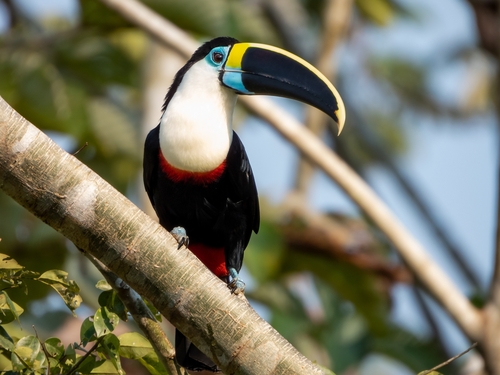
White-throated Toucan
The White-throated Toucan (*Ramphastos tucanus*) is a vibrant and iconic bird species native to South America's Amazon rainforest. Known for its large, colorful bill and striking plumage, it plays a crucial role in seed dispersal, contributing to the health and diversity of its rainforest habitat. This toucan is not only a symbol of the Amazon but also holds cultural significance for some indigenous communities, often appearing in folklore and traditional art. Its distinctive appearance and behavior make it a popular subject for birdwatchers and nature enthusiasts.
53-58 cm
Length
Not Evaluated cm
Wingspan
Least Concern
Conservation Status
Distribution
The White-throated Toucan is found across the Amazon Basin, including parts of Brazil, Venezuela, the Guianas, Colombia, Ecuador, Peru, and Bolivia. It primarily inhabits lowland tropical rainforests.
Lifespan
Up to 20 years in captivity; wild lifespan is less well-documented but estimated to be around 10-15 years.
White-throated Toucan's Habitat
Habitat Types
Tropical rainforest, Flooded forest (várzea), Forest edges
Climate Zones
Tropical
Adaptations
Their large bill, despite its appearance, is lightweight and used for reaching fruit on branches too small to support the bird's weight. The serrated edges help in gripping and manipulating food.
Variations
There are recognized subspecies, such as *Ramphastos tucanus tucanus* and *Ramphastos tucanus cuvieri*, which exhibit slight variations in bill coloration and size.
Appearance
Breeding Plumage
No significant differences between breeding and non-breeding plumage.
Seasonal Feather Changes
No seasonal variation.
Sex Based Plumage Differences
Males and females have similar plumage.
Notable Features
Large, colorful bill with black, yellow, and red markings., White throat and bib., Black body plumage with red undertail coverts.
Diet and Feeding
Primary Foods
Fruits, Insects, Small vertebrates (lizards, bird eggs, nestlings)
Foraging Behavior
Forages in the canopy, often in small groups. Uses its bill to pluck fruit and probe for insects and small animals.
Specializations
The bill's size and serrated edge are specializations for handling a wide variety of fruits. It also allows for efficient heat dissipation.
Seasonal Diet Variations
Diet may shift slightly depending on fruit availability, with a greater reliance on insects during periods of fruit scarcity.
Behavior
Social Structure
Typically found in pairs or small family groups. May congregate in larger groups at abundant food sources.
Communication
Loud, croaking calls ('yips' and 'yelps')., Bill-clacking.
Migration
Generally non-migratory, but may make local movements in response to food availability.
Territorial or Group Behaviors
May defend feeding territories, particularly during the breeding season.
Conservation
Threats
Habitat loss (deforestation), Hunting (for food and feathers), Pet trade (although less common than other toucan species)
Protection Programs
Protected areas within its range (national parks, reserves).
Local National Laws
Protected under various national laws across its range, prohibiting hunting and trade.
Population Trend
Decreasing
Population Estimates
While difficult to estimate precisely, the global population is considered to be relatively large, but declining due to habitat loss.
Interesting Facts
The toucan's large bill is a surprisingly efficient radiator.
It helps the bird regulate its body temperature in the hot, humid rainforest environment.
Toucans are important seed dispersers.
They consume fruits and pass the seeds intact, helping to regenerate the forest.
Toucans sleep with their bills tucked under their wings
reducing heat loss during cooler nights.
Faqs about White-throated Toucan
What is the purpose of a toucan's large bill?
The bill is used for reaching fruit, foraging for insects, attracting mates, and regulating body temperature.
Are toucans endangered?
The White-throated Toucan is currently listed as Least Concern by the IUCN, but its population is declining due to habitat loss and other threats.
Do toucans make good pets?
Toucans are wild animals and have complex needs that are difficult to meet in captivity. They are not recommended as pets. Consult a professional for expert advice.
Copyright @ Nature Style Limited. All Rights Reserved.
 English
English